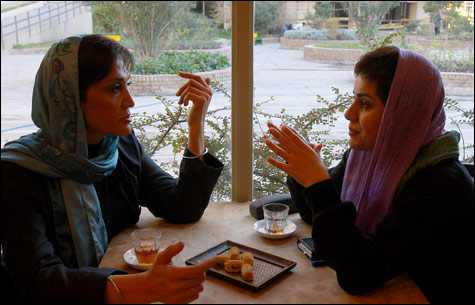
UNFINISHED STORIES: Pourya Azarbayjani weaves three tales with subtle and sometimes illuminating threads. |
| “Festival of Films from Iran” | Museum of Fine Arts: November 9-24 |
Another “Festival of Films from Iran” opens at the Museum of Fine Arts, and the Bush Administration still hasn’t started bombing Tehran. George and company had better hurry up, because, to judge from its movies, the country is closer to developing American culture than it is to developing a nuclear bomb.What, for example, could be more American than promoting indigenous products and denigrating foreign competition? Some of the 15 episodes in PERSIAN CARPET (2007; November 9 at 8 pm) — a compendium of shorts by leading Iranian directors reflecting on the title artwork — play like infomercials: a paean to a leading carpet manufacturer, a parable about a traditional weaver unmoved by a friend’s insistence that he relocate to a knockoff factory in China where he can make real money. But others are dazzling miniatures, as visually beautiful, evocative, and emblematic as details from the rugs themselves. My favorite is Majid Majidi’s “A Handmade Gift Presented to a Friend,” in which an old weaver waits outside his pal’s house in the city to unfurl the jewel-like carpet he’s made as a gift for him. Drawn by crumbs he drops from his lunch, birds alight on the carpet, mirroring the woven birds in the fabric.

In addition to these gorgeous carpets, 5000 years of Iranian culture have also given birth to Ahmad Reza Motamedi’s RULE OF THE GAME (2007; November 24 at 4:15 pm). This is the first Iranian comedy I’ve ever seen, and it’s a cultural shock. Not because it’s strange but because it’s familiar — despite the incomprehensible plot, the headscratching non sequiturs, and the garbled subtitles (“Once I had a headache he gave me an ‘E’ and I exploded so much I thought I was Cinderella” might well be a knee slapper in the original Farsi), I felt at home. In part that’s because I recognized the theme music from The Good, the Bad and the Ugly, Rocky, and The Godfather on the soundtrack. But mostly it was because some things are universal, like bad taste and dumb-ass comedies.
Yes, this is the kind of movie in which a guy knocks somebody out by sticking a smelly foot in his face. Not to mention the pie fight and an egregious blackface routine straight out of the Three Stooges. But it’s worth watching if only for the social insights. A patriarch has fathered both a snooty clan of rich people and an inbred gang of criminals and losers; the latter get the upper hand, of course. Perhaps that’s a reflection of the populism that helped elect President Mahmoud Ahmadinejad.
Not only are the Iranians knocking off our bad movies, they seem to be imitating the artsy ones as well, like Paul Haggis’s slick, multi-narrative Crash. More likely, however, Jafar Panahi’s The Circle provided the inspiration for Pourya Azarbayjani’s moving, elegantly constructed and ambiguous UNFINISHED STORIES (2007; November 23 at 8:30 pm). Story #1 starts with a teenage girl planning to run away with a boy whose rich parents disapprove of her; #2 involves a woman whose husband has thrown her out because she’s pregnant; #3 takes up the plight of a new mother who’s about to lose her baby because her husband is in prison and she can’t pay her hospital bill. Avoiding contrivance, Azarbayjani weaves these tales with subtle, sometimes illuminating threads, and the conclusion is an epiphany worthy of Krzysztof Kieslowski.
All but one of the desperate victims in Unfinished Stories is a woman (a heartbroken soldier’s story is about injustice to women from a different point of view), another reminder that despite — or because of — all the patriarchal oppression of the current Iranian theocracy, its cinema remains the most dynamically feminist in the world. Indeed, there are probably more women directors in the Makhmalbaf family than in any single Hollywood studio. Mahnaz Afzali’s documentary THE RED CARD (2006-’07; November 17 at 3:15 pm) takes a brash, smoothly constructed (video of court proceedings, Iranian tabloid headlines, home videos taken by the alleged killer, no resorting to voiceover) look at a criminal case that was the Iranian version of the O.J. trial. A former soccer star’s wife is found murdered and the husband’s mistress confesses, but during the ensuing proceedings grave doubts arise. The accused, Shahla Jahed, is a three-ring circus, her modes ranging from keening grief to angry denunciation to ingratiating sweet talk with the presiding judge as she argues that her confession was coerced and that someone else was the culprit. When evidence turns up about a mystery person and a possible sexual assault, she starts to look like another female scapegoat.